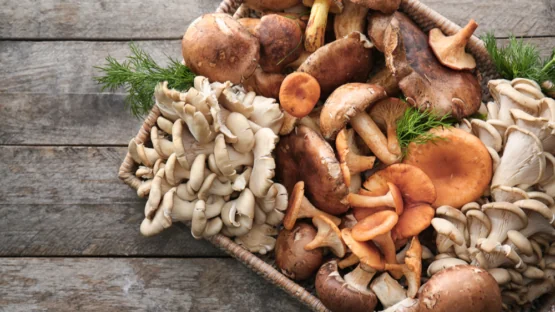Scientists have reported that protein derived from mushrooms (mycoprotein) has a similar impact on muscle mass and strength as animal-based protein in young, healthy people undergoing resistance training [1].
Choosing between animal and non-animal sources
Proteins are essential for muscle building, and strong muscles are important for healthy aging. However, this does not mean that a high-protein diet is beneficial, and proteins from various sources are not the same. While a vegan diet can be protein-rich and some people choose not to consume animal proteins for ethical reasons, several studies have suggested that plant proteins are inferior in terms of digestibility and amino acid content [2]. On the other hand, plant protein consumption has been associated with lower all-cause and cardiovascular mortality [3].
Therefore, the question of whether plant protein can be as effective in muscle building as animal protein deserves an answer. Several studies have contributed to this discussion, showing good results for pea [4] and rice [5] proteins.
No clear winner
In this new trial, young, healthy people were subjected to a vigorous training protocol while fed protein-rich diets. One group received protein from various sources (the omnivorous group), while the other did not consume animal protein; instead, their protein was mostly mycoprotein. The researchers used products made by Quorn Foods, a British company that specializes in mycoprotein-based meat substitutes. The study was sponsored by Quorn, but it was designed, conducted, and supervised by the University of Exeter.
The participants consumed 1.8 g of protein per kilogram of body mass per day, which is about twice the recommended amount. The researchers attempted to make both diets as healthy as possible. In both groups, around 25% of energy was provided by fat, and around 50% came from carbohydrates. The daily meals were also largely identical, except for the primary protein source.
Importantly, the vast majority of the participants were habitual omnivores rather than vegetarians or vegans, meaning that whatever long-term consequences of a plant-based diet for muscle building might be, they did not influence the study.
The participants exercised five times per week for 10 weeks in a program designed to maximize muscle hypertrophy. The researchers assessed parameters such as body mass, lean mass, the rate of protein synthesis in the muscles (MyoPS), the size of the muscle fibers, and strength.
Over the course of the experiment, energy, protein, fat, and carbohydrate intakes did not differ between groups. The one notable exclusion was fiber intake, which was double in the plant-based group compared to the omnivorous group, due to the high fiber content of the mycoprotein source (more fiber in your diet is generally considered healthy).
Most of the results did not differ between the groups. Both the omnivorous and vegan groups seemed to benefit equally from the vigorous exercise and the protein-rich diet, putting on muscle mass and increasing muscle strength. Concurrently, daily MyoPS rates were also largely similar for both groups. In a notable exception, in the vegan group, the percentage of the increase in muscle strength was significantly greater for the incline bench press and borderline greater (P = 0.0526) for the deadlift.
The researchers note that while protein consumption targets were achieved in both groups, it was anecdotally harder for the participants on the vegan diet to consume the required amount of protein. This is consistent with previous research that shows somewhat lower protein consumption by vegans and vegetarians than by omnivores.
The limitations
The study had several important limitations. First, the sample size was small, with about ten people in each group. Second, the study was open-label (as opposed to blind), meaning that both the participants themselves and the researchers knew which diet each participant was on. Finally, the study was free-living: the participants only came to the research center from time to time, eating at home and being allowed to exercise at an external gym. This made it impossible to effectively monitor compliance, which might explain the rather high variability of the results.
Dr. Alistair Monteyne, one of the researchers behind the study, said in a statement:
It is well established that muscle building can be augmented by adhering to a high protein diet. Our study demonstrates that mycoprotein is comparable to animal proteins in terms of its ability to facilitate increases in muscle mass and strength in young adults who are regularly engaging in resistance training.
Conclusion
Despite its limitations, this study lends additional support to the hypothesis that non-animal protein can be just as effective in muscle building as animal-derived protein. It also draws attention to an interesting novel source of protein that might gain more prominence in the coming years.
Literature
[1] Monteyne, A. J., Coelho, M. O., Murton, A. J., Abdelrahman, D. R., Blackwell, J. R., Koscien, C. P., … & Wall, B. T. (2023). Vegan and Omnivorous High Protein Diets Support Comparable Daily Myofibrillar Protein Synthesis Rates and Skeletal Muscle Hypertrophy in Young Adults. The Journal of Nutrition.
[2] van Vliet, S., Burd, N. A., & van Loon, L. J. (2015). The skeletal muscle anabolic response to plant-versus animal-based protein consumption. The Journal of nutrition, 145(9), 1981-1991.
[3] Naghshi, S., Sadeghi, O., Willett, W. C., & Esmaillzadeh, A. (2020). Dietary intake of total, animal, and plant proteins and risk of all cause, cardiovascular, and cancer mortality: systematic review and dose-response meta-analysis of prospective cohort studies. bmj, 370.
[4] Babault, N., Païzis, C., Deley, G., Guérin-Deremaux, L., Saniez, M. H., Lefranc-Millot, C., & Allaert, F. A. (2015). Pea proteins oral supplementation promotes muscle thickness gains during resistance training: a double-blind, randomized, Placebo-controlled clinical trial vs. Whey protein. Journal of the International Society of Sports Nutrition, 12(1), 3.
[5] Joy, J. M., Lowery, R. P., Wilson, J. M., Purpura, M., De Souza, E. O., Wilson, S., … & Jäger, R. (2013). The effects of 8 weeks of whey or rice protein supplementation on body composition and exercise performance. Nutrition journal, 12(1), 1-7.




